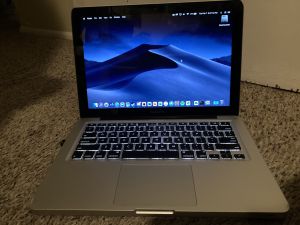2012 MacBook Pro 9,2
More actions
 | |
 2012 MacBook Pro | |
| Also known as | 13-inch 2012 MacBook Pro |
|---|---|
| Manufacturer | Apple |
| Product family | MacBook Pro |
| Type | Laptop computer |
| Release date | June 11, 2012 |
| Introductory price | $1199 |
| Operating system | macOS 10.15.7 Catalina |
| CPU | Intel Core i5-3210M @ 2.5 GHz |
| Memory | 6 GB (DDR3L 1600 MHz) |
| Storage | 240 GB Kingston A400 SATA SSD |
| Display | 13.3 in (34 cm) 1280x800 |
| Graphics | Intel HD Graphics 4000 |
| Connectivity | 1 MagSafe, 1 FireWire 800, 1 Thunderbolt, 2 USB 3.0, 1 Audio jack, 1 SDXC slot, 1 SuperDrive |
| Website | https://www.apple.com |
The 2012 MacBook Pro is a high-end MacBook and the last model without a Retina display. The 2012 MacBook Pro came in a 13-inch and 15-inch variant along with Retina display variants later in 2012. All variants had options for a 500 GB to 750 GB hard drive (with some allowing for a 1 TB HDD) or 128 GB to 512 GB solid-state drive. The minimum amount of RAM preinstalled is 4 GB DDR3 and Apple allowed buyers to select up to 8 GB; however, the systems can support up to 16 GB total.
Collection Specifics
My specific model is the 13-inch non-Retina model with an Intel Core i5-3210M. I got this MacBook off of Mercari on February 7, 2023 for $50 + $16 shipping. The reason I got this MacBook is because these 2012 MacBook Pros are known for being very good computers still. They support up to macOS 10.15 Catalina officially and still have very good hardware, especially paired with a SSD. Additionally, I have many memories of using MacBook Pros of this era in school for a little while.
Operating System
Originally, the 2012 MacBook Pros shipped with Mac OS X 10.7 Lion and came with a free upgrade to OS X 10.8 Mountain Lion because of it coming out later in 2012. These MacBooks were officially supported for a good 7 years or so, with Apple only just dropping support for them in 2019 with macOS 10.15 Catalina.
When I received this MacBook, I replaced the hard drive with a solid-state drive and chose to install macOS 10.14 Mojave instead of Catalina. This is because I wanted to retain the 32-bit application support in Mojave that was removed in Catalina. Mojave is still a very usable operating system, so there's not much trade-off using it over Catalina.
Unfortunately, the above statement did not age very well, as many programs have since dropped support for Mojave. I gave in and upgraded to Catalina since I didn't actually have any specific use for 32-bit application support in Mojave. Now, I can keep using Firefox, Steam, Discord, and OneDrive for a little while longer on this Mac.
Hardware
You may have noticed the unusual 6 GB of RAM in this machine. This definitely was not an option that Apple provided when purchasing this device, so most likely, this machine originally had only 4 GB of memory and someone decided to swap out one of the 2 GB sticks with a 4 GB stick, resulting in 6 GB.
The HGST 500 GB, 5400 RPM hard drive that I got with this computer is likely the original from when it was purchased, but I've gone ahead and upgraded it with a 240 GB Kingston A400 SSD.
The only thing that appears to be broken on this laptop is part of the keyboard. All of the keys work perfectly fine except for the keys 1 through 9. This kind of sucks, because the rest of this laptop is really nice and still works well, including the battery, and the keyboard is a hassle to replace. Eventually, I might fix it, but that will be something that I likely procrastinate for a little while.
